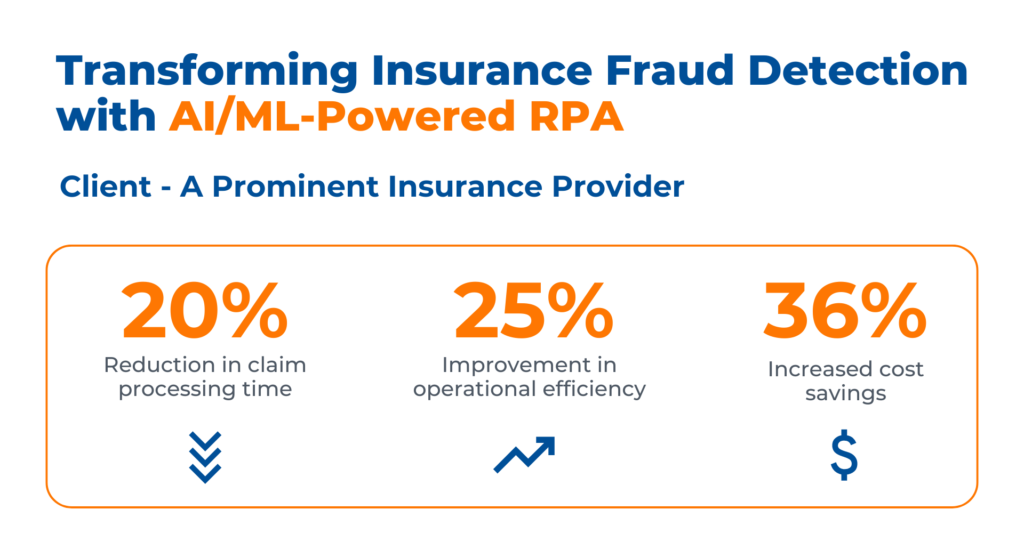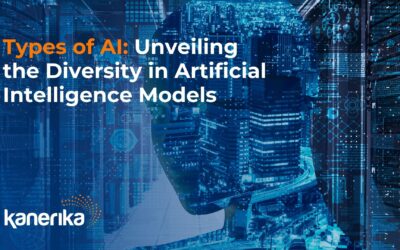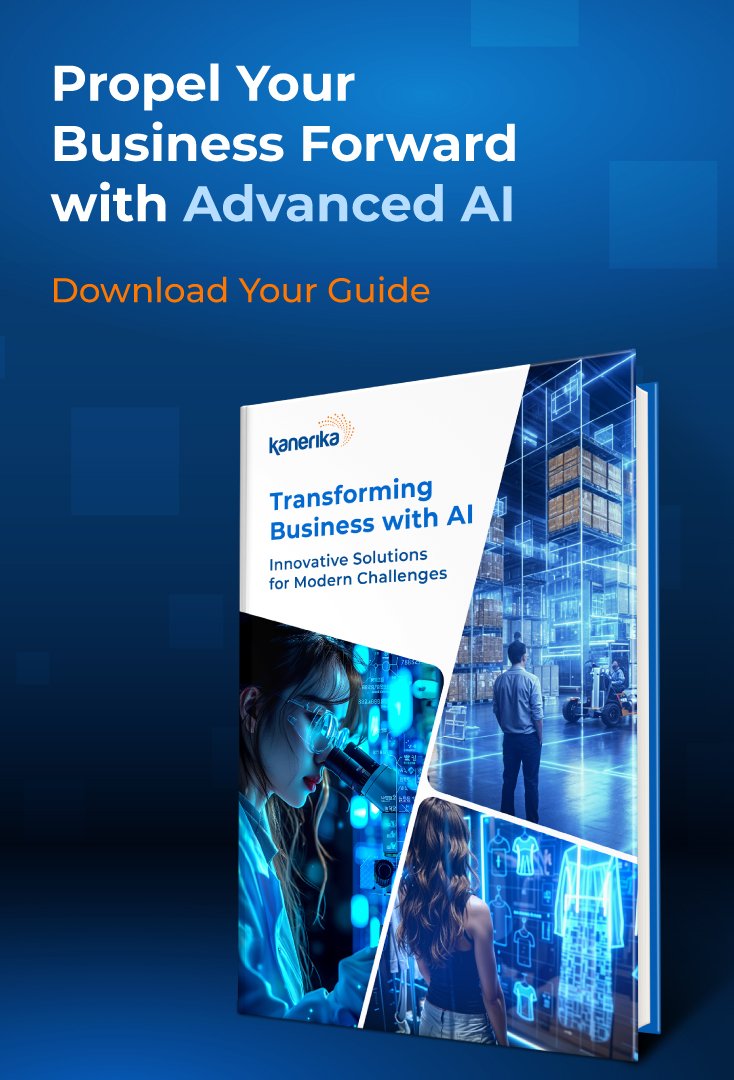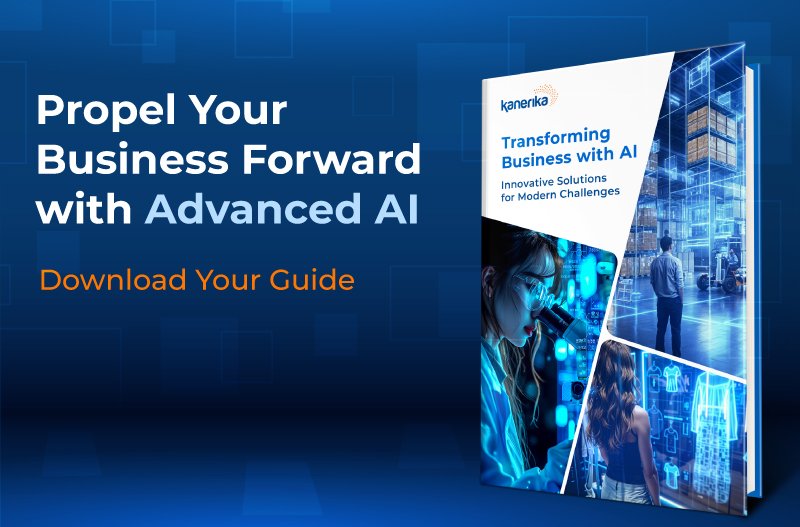Envision a world where machines predict market trends with great precision, optimize healthcare decisions for each patient, and customize customer experiences to fit every individual’s preference. This is the reality that machine learning consulting brings to businesses today.
Did you know that, according to Grand View Research, the global machine learning market is expected to hit USD 419.94 billion by 2030? This growth explosion is not surprising, considering how much businesses across industries have transformed by adopting machine learning.
Machine learning has become a cornerstone of modern business strategy, enhancing operational efficiency, driving innovation, and improving decision-making. Machine learning consulting companies provide data-driven insights services that enable firms to leverage them to be ahead in today’s competitive environment.
This blog will delve into the realm of machine learning consulting—its significance, benefits, and its pivotal role in shaping the future of business.
Table of Contents
- What is Machine Learning Consulting?
- Why Choose Machine Learning Consulting Services?
- Benefits of Machine Learning Consulting
- Machine Learning Consulting Process: A Step-by-Step Guide
- Machine Learning Consulting: Industry-specific Applications
- Future Trends in Machine Learning Consulting
- Choosing the Right Machine Learning Consulting Partner
- Case Study: Revolutionizing Fraud Detection in Insurance with AI/ML-Powered RPA
- The Kanerika Advantage: Leveraging Machine Learning for Business Growth
- FAQs
What is Machine Learning Consulting?
Machine learning is a branch of Artificial Intelligence (AI) where computers learn and improve without explicit programming. They analyze data to identify patterns and make predictions, essentially becoming experts in a specific domain.
Machine learning Consulting is a specialized service that helps businesses leverage ML to solve real-world problems and gain a competitive edge. It encompasses various activities, such as studying current data infrastructures and creating custom machine learning models that fit perfectly into the business model. Consultants act as strategic partners, guiding companies through the entire ML journey:
Machine learning consulting bridges the gap between the immense potential of machine learning (ML) and its practical application within your business. It goes beyond simply building models. It’s about harnessing the power of data to drive real-world business results. Imagine a team of data scientists and business strategists working together to unlock the hidden gems buried within your company’s information.
In essence, machine learning consultants act as expert guides, helping you navigate the world of ML. Their scope encompasses a range of services, including:
- Identifying opportunities: Consultants assess your business goals and data landscape to pinpoint areas where ML can deliver significant value.
- Strategy and planning: They work with you to develop a customized ML strategy, selecting the right algorithms and outlining a clear roadmap for implementation.
- Model development and deployment: Consultants handle the technical aspects of building and integrating ML models into your existing workflows.
- Monitoring and optimization: They ensure the ongoing performance and accuracy of your ML models, refining them as needed based on new data.
Why Choose Machine Learning Consulting Services?
The scope of machine learning consulting spreads across different sectors like healthcare, finance, and retail, among others. The role of consultants includes close collaborations with clients to understand their goals and problems, assess the abilities of their organization in handling data so as to come up with specific recommendations for using machine learning effectively.
Some key aspects of machine learning consulting include data preprocessing, feature engineering, model selection and training, validation and deployment. They are also responsible for ensuring ethical application of machine learning algorithms by addressing bias and maintaining transparency throughout the process.
In general, the objective behind “machine learning consulting” is to furnish businesses with actionable insights, forecasting abilities, and innovative solutions to enhance growth efficiently while remaining competitive in today’s data-driven world.
Benefits of Machine Learning Consulting
Machine learning consulting services offer numerous advantages that can impact a business’s success greatly. Below are the key reasons why businesses opt for machine learning consulting:
1. Expert Data Management and Analysis
Machine learning algorithms thrive on clean, well-organized data. This is where consultants come in. They are experts in assessing your data infrastructure, cleaning up your information, and ensuring quality. They can also develop a good data management strategy for long-term success.
2. Predictive Modeling and Forecasting
One of the most fascinating things about machine learning is that it can use previous data to anticipate future trends. Consultants can create custom models to project customer behavior, market requirements, or even equipment failures.
Read our Case Study- Revolutionizing Operations through Telemetric Data Transformation and Integration
3. Improved Decision-Making
Intuition is no longer enough today. Machine Learning Consulting allows you to make real-time decisions based on actual analytical results. Consultants can help translate complex data insights into actionable recommendations, giving you the confidence to make strategic choices that propel your business forward.
4. Enhanced Efficiency through Automation
Machine learning does an exceptional job of automating repetitive tasks. Consultants can identify areas within your operations that could benefit from streamlining through automation, freeing resources for other strategic pursuits. This means they get more work done at low costs.
5. Uncovering Hidden Patterns and Customer Insights
Traditional analytics methods may miss customer insights and hidden patterns that machine learning might uncover. Consultants can assist you in utilizing this information to improve product offerings, tailor marketing strategies, and provide an exceptional client experience.
Machine Learning Consulting Process: A Step-by-Step Guide
1. Assessment and Analysis
Assessing Client Needs and Objectives: Machine learning consultants start by understanding their client’s business goals, challenges, and expected results. This involves holding interviews, workshops, and surveys to collect requirements and align expectations. Consultants then determine the key performance indicators (KPIs) and success standards that will measure project efficiency.
Evaluation of Existing Data Infrastructure: Consultants analyze the client’s data infrastructure, including data sources, storage systems, data quality, and accessibility. They evaluate how complete the data is and whether it is consistent or inaccurate enough to be used for analysis purposes. Through this analysis, consultants are informed about what they still need to find out through additional data collection or gaps from which they can enrich their dataset.
Read More – Automated Machine Learning
2. Model Design and Development
Designing Machine Learning Models: Based on the findings in the assessments, consultants develop models specifically for tackling various kinds of corporate obstacles. This encompasses choosing appropriate algorithms (e.g., regression, classification, and clustering), designing features, creating model architecture, and tuning hyperparameters. Consultants create prototypes or proof-of-concepts (POCs) to validate model feasibility.
Testing and Refining Algorithms: These consultants rigorously test the machine learning algorithms using historical data. In terms of accuracy rate, there are other model performance metrics such as precision rate, recall rate, and F1-score. While assessing this performance, regular adjustments like tweaking parameters, optimizing the algorithms, and solving issues associated with overfitting or underfitting must be made.
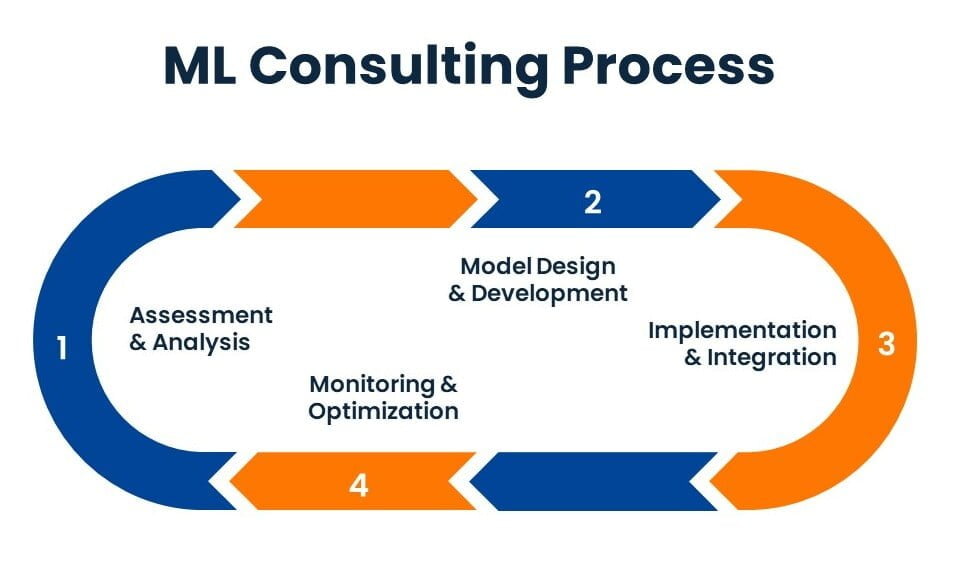
3. Implementation and Integration
Deploying Solutions into Existing Systems: After verifying the models’ validity, consultants deploy them into clients’ existing systems or infrastructures. It may involve either cloud-based deployment (e.g., AWS Azure) or on-premise deployment, depending on the client’s needs and technical requirements that have been followed, among others. Consultants ensure seamless integration with databases, applications, APIs, and workflows.
Training and Supporting Staff: Consultants train end-users, stakeholders, and IT teams to understand the new machine learning solutions. Training involves understanding model outputs, interpreting results, and learning best practices for incorporating predictive insights. Consultants provide continuous support via documentation in case of any issues or problems clients face while adopting the solutions that have been provided.
Explore Case Study- Revolutionizing Predictive Fleet Maintenance Solutions
4. Monitoring and Optimization
Continuous Performance Monitoring: Consultants implement monitoring tools, dashboards, and alerts to continuously monitor the performance of deployed machine learning models. This involves tracking KPIs, detecting anomalies, drifts, or degradation in model performance, and generating actionable insights. Consultants analyze monitoring data to identify areas for improvement.
Iterative Improvements and Updates: These expert consultants enhance the models’ accuracy, efficiency, and relevance over time based on feedback from monitoring outcomes and subsequent performance analysis. These involve retraining models with new data incorporation of user feedback modification onto algorithms implementation of enhancements/optimizations, etc.” Iterative improvements cycles ensure that business needs change and hence must be aligned with evolving data dynamics.
Read More – Unlock Full Potential of your Start-Up with our VAS
Machine Learning Consulting: Industry-specific Applications
ML consulting firms are leading the way in helping companies maximize the potential of their data. Below are some important applications of machine learning in diverse industries:
1. Retail and E-commerce
Recommendation Engines: Personalize the shopping experience by using ML to suggest products based on past purchases, browsing behavior, and customer demographics.
Demand Forecasting: Optimize inventory management and prevent stockouts by predicting future demand for specific products using historical sales data and external factors such as weather patterns or holidays.
Fraud Detection: Analysis of transaction patterns by machine learning algorithms can enable real-time identification and prevention of fraudulent activities, which saves businesses and customers from losses.
2. Manufacturing and Supply Chain
Predictive Maintenance: Reduce downtime and maintenance costs by using ML models, which predict equipment failures before they happen, thus facilitating proactive maintenance practices.
Quality Control Automation: Deploying image recognition powered by machine learning will automate visual inspection processes that accurately identify defects in products.
Supply Chain Optimization: To optimize logistics systems as well as transportation networks, apply ML algorithms to analyze data about routes, traffic flows or delivery schedules.
3. Finance and Banking
Credit Risk Assessment: Develop ML models to assess loan applications and predict borrower creditworthiness resulting in better lending decisions.
Fraud Detection: Just like in retail, financial transactions can also be analyzed by machine learning to prevent fraudulent activities such as money laundering.
Algorithmic Trading: Create trading methods that make real-time data-driven automated trading decisions based on market patterns and machine learning algorithms
4. Healthcare and Pharmaceuticals
Drug Discovery and Development: Use Machine Learning (ML) to examine large genetic/molecular datasets thereby accelerating the discovery/development of new drugs faster
Medical Diagnosis Support: Designing medical diagnosis support systems encompassing the use of artificial intelligence helps doctors interpret patient data such as scans better
Personalized Medicine: Apply Machine learning methods that analyze patients’ unique genetic make-up and disease history to generate individual treatment plans.
Future Trends in Machine Learning Consulting
1. Democratization of ML
ML is becoming more accessible to organizations of all sizes due to the emergence of user-friendly tools and platforms, This democratization process will be greatly aided by machine learning consulting firms as they:
Develop intuitive interfaces and pre-built models: These user-friendly tools will empower businesses to experiment with ML even without extensive technical knowledge.
Provide training and support: Consulting firms will offer educational resources and support services to help businesses understand and effectively utilize these democratized ML tools.
2. Explainable AI (XAI)
As machine learning models become increasingly complex, the need for explainability and transparency grows. Explainable AI (XAI) techniques will be crucial for building trust in ML models and ensuring they are aligned with ethical considerations. Machine learning consulting firms will need to:
Integrate XAI tools and techniques: Consultants will leverage tools that help explain how models arrive at their decisions, fostering trust and understanding for stakeholders.
Communicate model logic effectively: They will need to translate complex technical concepts into simpler explanations for non-technical persons so that everyone understands the reasoning behind the model’s predictions.
3. Integrating ML with Cutting-Edge Technologies
The future lies in its seamless integration with other emerging technologies like blockchain and the Internet of Things (IoT). Machine learning consulting firms will need to adapt by:
Building expertise in complementary technologies: ML Consultants should expand their skillsets in not just ML, but also blockchain and IoT, learning how these technologies can work together to create even more powerful solutions.
Developing integrated solutions: Consulting firms will help businesses design and implement solutions that take advantage of the combined power of ML, blockchain, and IoT to discover new possibilities and gain a significant competitive edge.
Choosing the Right Machine Learning Consulting Partner
Machine learning consulting world can be exciting and complex. However, choosing the right firm is critical. In assessing ML consulting firms, consider the following factors.
1. Expertise in Machine Learning Applications
This is one aspect that you should consider when selecting a machine learning consultancy. Their familiarity with relevant industry applications is a significant aspect to look at. This encompasses an in-depth knowledge of machine learning technologies and techniques that are suitable for your business requirements as well. For example, if you are working in the healthcare sector, you have to know about medical image analysis, patient outcome prediction, or healthcare analytics. They need to be aware of domain-specific data types, regulations, and best practices so that they can develop customized solutions that address your specific concerns.
2. Proven Track Record of Successful ML Projects
Another important factor is determining how successful the consulting partner has been in implementing machine learning projects. You can rely on case studies, success stories, and customer testimonials as clear evidence of their abilities. Measurable outcomes such as better precision, cost savings, operational efficiency improvements, or revenue growth should be considered. In addition, examining how complex and large-scale their previous engagements were may be useful as this can give you insights regarding whether they qualify to handle your unique needs capably.

3. Understanding the Importance Data Security
Data security is essential, especially when it comes to sensitive and personal information used in machine learning. A reliable consulting firm will prove its expertise in this field through strict adherence to data protection laws such as CCPA, HIPAA, or GDPR. The company’s certifications must show its commitment towards data privacy handling, while its policies and procedures should lay emphasis on safeguarding this resource at all costs throughout the project lifecycle; hence, it should cover secure collection, storage, processing, and analysis of data.
4. Clear Communication And Collaboration
Make sure there is effective communication and collaboration between you and the machine learning consulting company. Consultants should have clear communication and transparency and are proactively involved in the projects all the time. They should answer all your questions, constantly update you, and involve you in decision-making processes. Moreover, assess how they collaborate with your internal teams, stakeholders, and other suppliers, if any. If they do this, it will create cooperation among them, hence creating a collective approach that aligns individual goals, leading to successful project delivery outcomes.
Case Study: Revolutionizing Fraud Detection in Insurance with AI/ML-Powered RPA
Business Context
The client is a prominent insurance provider, specializing in healthcare, travel, and accident coverage. They wanted to automate their insurance claim process solution with AI/ML to spot unusual patterns that are unnoticeable by the humans. The overall goal was to use deep anomaly detection to anticipate fraud detection in insurance claims quickly, reduce the loss ratios, and fasten the claim processing.
Kanerika tackled these challenges by:
- Implementing AI RPA for fraud detection in the insurance claim process, reducing fraud-related financial losses.
- Leveraging predictive analytics, AI, NLP, and image recognition to monitor customer behavior, enhancing customer satisfaction.
- Delivering AI/ML-driven RPA solutions for fraud assessment and operational excellence, resulting in cost savings
The Kanerika Advantage: Leveraging Machine Learning for Business Growth
Kanerika’s expertise in ML and AI technologies empowers enterprises to tackle business challenges and foster sustainable growth. By harnessing advanced algorithms and data analytics, Kanerika delivers tailored solutions for predictive maintenance, customer segmentation, demand forecasting, and process optimization.
Our deep understanding of industry-specific needs enables precise problem-solving, leading to improved efficiency, cost savings, and enhanced decision-making. Kanerika’s holistic approach ensures seamless integration, scalability, and continuous innovation, enabling businesses to stay ahead of their competitors.









